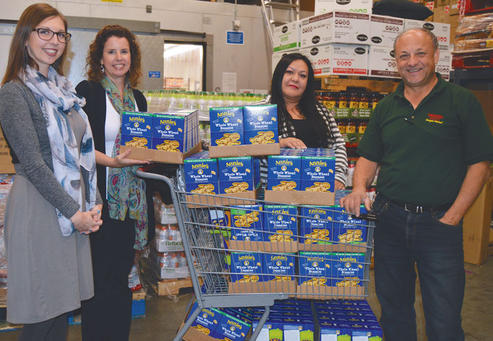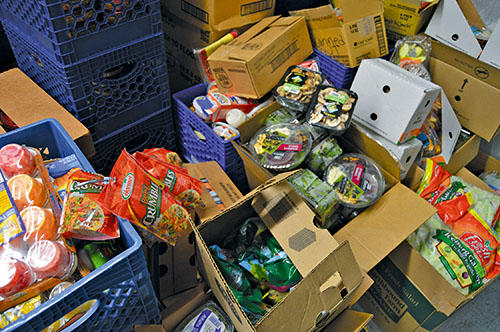In February, France became the first country in the world to ban large grocery stores from discarding or destroying unsold food. Instead, stores are required to donate unsold edible food to charities or food banks.
For the last 27 years, Food Finders has been “rescuing food and ending hunger” as it works with grocery stores, schools and other facilities in Long Beach and all of Los Angeles and Orange counties to stop food waste.

Food Finders, an organization that collects edible food that would otherwise be thrown away at grocery stores, schools and other facilities, is on course to collect and donate 8.5 million pounds of food this year. Pictured from left: Leigh Behrens, recycling specialist with the Long Beach Environmental Services Bureau (ESB); Patti Larson, executive director of Food Finders; Elisa Calderon, recycling specialist at the ESB; Steve Uhrinak, co-owner and operator of Grocery Outlet on 7th Street. (Photograph by the Business Journal’s Larry Duncan)
“We work with as many grocery stores as are able to participate that are not already assigned to another program,” Patti Larson, executive director of Food Finders, said. “We pick up from hospitals. We pick up from catering companies. Anybody that has food overages, basically. We’re on course for 8.5 million pounds for the year.”
Larson, who has been with the organization since 2009, said Food Finders is funded through grants, several fundraisers per year, donations and various private and corporate foundations. Food pickup for participating facilities is free and often handled by volunteers. However, Food Finders employs several staff drivers to handle larger pickups.
Leigh Behrens, recycling specialist with the Long Beach Environmental Services Bureau, said that California is on the same wavelength as France. Behrens explained that California Assembly Bill 1826, which saw the first phase implemented in April, requires businesses that generate certain quantities of food waste to utilize alternatives to remove it from the waste stream. Aside from donating edible food, spoiled food can be turned into compost or biofuels.
“This is the first step toward those same types of mandates that you hear about in other countries,” Behrens said. “Approximately one-third of everything that is thrown away is food waste. Some portion of that is still able to feed people in Long Beach. That is a very important opportunity that we like to see happening here in the city.”
Steve Uhrinak, co-owner and operator of Grocery Outlet on 7th Street, signed up his store for Food Finders’ services in mid-September, three weeks after the location opened. Currently, Food Finders picks up donations from Uhrinak’s store every Tuesday; however, he said he is in the process of working out a more frequent schedule to reduce spoilage of perishable food items and keep his backroom clear.
Uhrinak explained that he has an employee whose job is to check all inventory on the shelves, reduce prices as products near the sell-by date and remove items when the date is reached. Certain shelf-stable items, such as canned and boxed foods, are still consumable for months or even years, according to Uhrinak.
“We’re probably donating upwards of $500 per week just for those types of commodities,” Uhrinak said. “And, because they’ve been weekly pickups, the perishables have been less – probably $200 or $300 per week in perishables. We’re not donating anything that’s spoiled or anything like that.”
Some larger chain stores, such as Albertsons, are able to use food donations as a tax write-off, but this is not the case for Uhrinak’s location. He explained that his store sells product on consignment, which means he does not own the inventory and is therefore not entitled to write off his food donations. However, he pointed out that there are far better reasons for his store to donate unsold food.

Grocery Outlet donates around $500 of shelf-able foods, such as canned and boxed goods, and around $250 of perishable foods every Tuesday. (Photograph by the Business Journal’s Larry Duncan)
“We realize that we have to give back to the community, and it’s important for us to support people in need,” Uhrinak said. “The worst thing I can think of is throwing away food. . . . So we want to be able to contribute our little bit, however much that is, to solve multiple problems.”
Larson explained that Food Finders began working with a couple of schools four or five years ago by having them donate extra food from the cafeterias and lunch programs. According to Larson, these types of donations are typically given to programs for kids or seniors. The number of participating schools has increased greatly over the year, which is good because it is a great way to teach kids, and every little bit helps, she said.
“In the City of Long Beach, we have approximately 90 schools in our recycling program, meaning they can choose to go with their own private hauler to pick up their trash and recycling or the school district does their own hauling,” Elisa Calderon, recycling specialist at the Long Beach Environmental Services Bureau, said. “So, when I go to the schools, I offer them the services of Food Finders so they can reach that next goal of not just recycling paper and cardboard but also the food.”
According to cafoodbanks.org, the California food insecurity rate is 12.6%, meaning 1 in 8 Californians do not know where their next meal will come from. Of the nearly 5 million people facing food insecurity in the state, more than 2 million are children, with a ratio closer to 1 in 4. Larson explained the ratios in Long Beach are slightly worse than state numbers.
These statistics are an example of the first tier of what Behrens calls the city’s “triple bottom line” that spurs such strong support for programs such as Food Finders: to feed people in need by giving them food that would otherwise be thrown away. The other two reasons are to have a positive environmental impact by reducing the waste stream and to save Long Beach businesses money by reducing trash bills.
For more information about Food Finders, to donate or to volunteer, visit foodfinders.org or call 562/283-1400. For more information on the city’s recycling efforts, visit longbeachrecycles.org.
